So far, our gazetteer of British crime has covered Scotland and East Anglia, where we’ve met interesting authors and seen – a little bit at least – how the landforms, history and local culture have influenced them. In our third instalment, we head to another corner of the kingdom and look at what crime writers have been doing in the West Country.
Part 3: The South West
For many Brits, the South West means sun, sandy beaches and long trips in the car with bad tempered children. However, the region is covered with large swathes of ominous moors and heathland. It’s under-populated relative to other parts of the country, and when the mists roll in it presents writers with a wild and foreboding atmosphere to exploit. Perhaps the most memorable crime story ever penned, and one which can still send chills up your spine, is Arthur Conan Doyle’s masterly Hound of the Baskervilles. Set on Dartmoor, it’s a perfect example of what we’re talking about. Here, however, we’re keeping things contemporary and our four authors are all, happily, still producing crime novels for us to enjoy.
Bristol is one of Britain’s oldest cities, with a celebrated seafaring heritage. Hudson and Cabot both sailed from its docks for their adventures in the New World. It’s a city of commerce, was home to more than a few pirates, and it has officially apologised for its unenviable role in the slave trade. On a more positive note Bristol is linked with the great Victorian engineer, Brunel.
Its place in the pantheon of modern crime fiction is assured thanks to the work of Mo Hayder. Her central character is DI Jack Caffery of the city’s Major Crime Unit. Caffery is everything a fictional DI should be – brooding, temperamental and impulsive rather than analytical. He has the obligatory tortured personal life too. In the seventh book, Wolf, we have trademark blood and gore, a race against time, and Caffery trying to do his job properly despite battling his own demons. The Mystery Writers of America awarded Hayder’s Gone with the Edgar Award for Best Novel in 2012.
Graham Hurley’s books include a series set in Portsmouth, featuring the brilliant but ever-anxious copper Joe Faraday. However, his more recent releases are centred on Jimmy Suttle, once one of Faraday’s apprentices, but now with a big job of his own over in Exmouth, Devon.
After the demise of Faraday, which was a brave decision by the author, Western Approaches sees Suttle taking his wife and daughter down to Devon. While his new job fits him like a glove, his wife Lizzie is an ambitious journalist and a city girl at heart. She struggles to cope in their isolated cottage, with its antiquated plumbing, non-existent central heating and numerous leaks in the roof. The contrast between Suttle’s satisfaction in his new job and Lizzie’s growing despondency can only lead to one outcome, and in the most recent novel in the series, Sins of the Father (2014), tragedy leads to separation and Jimmy and Lizzy reach a turning point in their lives.
Pompey is naval slang for Portsmouth. Is it in the West Country? Well, we think it’s close enough and this brings us to Pauline Rowson who introduced DI Andy Horton with Tide of Death in 2006. Like all the best fictional DIs, he has his problems. Needing rehabilitation after a suspension, and with a rape charge hanging over his head, Horton’s professional life gets more complicated when he must track down a vicious murderer while working with colleagues whose personal lives are as fractured as his own. Horton has gone on to feature in a dozen books, each with a nautical connection in the title, and each one wedded to the unique social, political and topographical landscape of Portsmouth. For centuries it has been a symbol of Britain’s naval history, but it’s become a town of great social deprivation.
Pauline Rowson has not abandoned Andy Horton, but has begun a new series featuring the former marine, Art Marvik. In the first book, Silent Running (2015), Marvik is framed for murder and abduction, and his only recourse is to to prove his innocence by unmasking the real culprits. Pauline Rowson also runs the successful crime fiction event CSI Portsmouth.

Back to glorious Devon, but this time to its north coast. Belinda Bauer has established herself as a writer who is prepared to take readers deep down into the darkness of the human condition. Bauer grew up in England and South Africa, and remembers her childhood under apartheid. Now a successful journalist by trade, she has set several novels in the West Country. Blacklands (2010) and Finders Keepers (2012) are both set on Exmoor, which you may remember as the setting for Lorna Doone.
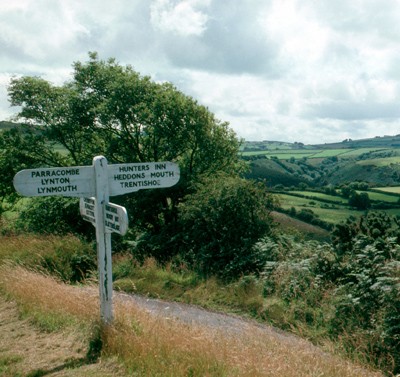
Belinda Bauer excels in bringing out the quirky, comic aspects of people’s lives which may seem trivial, but actually presage dark and destructive consequences. In his review of The Facts of Life and Death, our writer Andre Paine likened Bauer’s use of the landscape to that of Daphne du Maurier in her Cornish novels. When we read a novel by Belinda Bauer, we are quickly disabused of any notion that living in the countryside is idyllic. Public transport is patchy and shuts down after tea, and teenagers become marooned in isolated villages with little to do. In village communities old grievances can fester and turn septic, and cottage gardens can become a pretty front for the worst kind of crimes. You can read our 2014 interview with Belinda Bauer here.
What are your favourite crime novels set in the West Country? We’d particularly like to hear about books set in Cornwall. Let us know in the comments below.






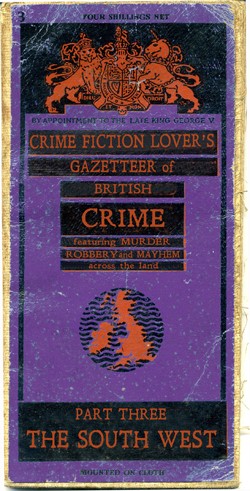
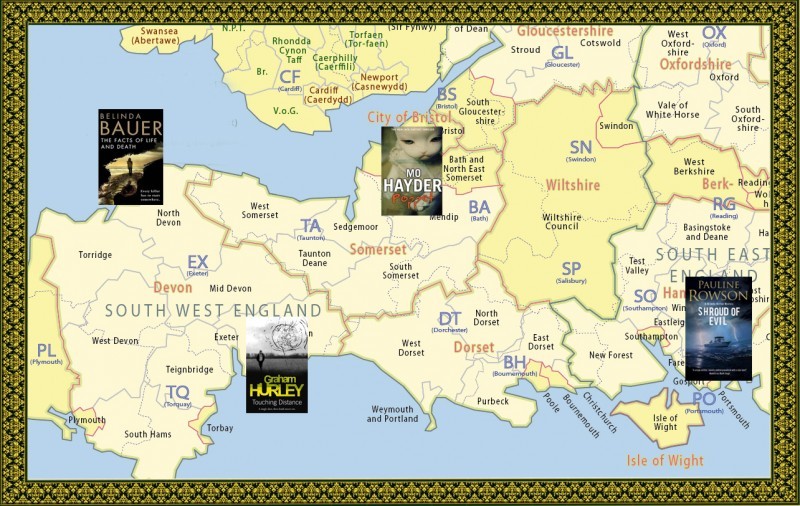

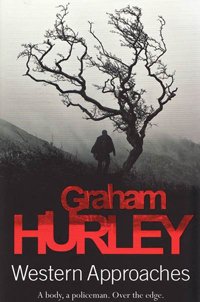







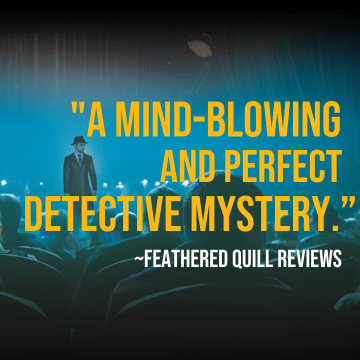
Agreed, The Hound of the Baskervilles has to be the ultimate South West crime novel, if not the ultimate crime novel of all time.
Another West Country choice would be the Peter Diamond series, set in Bath, by Peter Lovesey.
Here’s a review of Cop to Corpse – http://www.crimefictionlover.co.uk/2012/05/cop-to-corpse/
Then down the road in Midsomer Norton there are Caroline Graham’s Chief Inspector Barnaby novels, adapted into the long running Midsomer Murders TV series.
Oh, and MR Hall’s The Chosen Dead is a forensic mystery also based in Bristol http://www.crimefictionlover.co.uk/2013/01/the-chosen-dead/
It received five stars when reviewed.
Nice to see DI Andy Horton’s patch included here, and he does get to travel from the Isle of Wight to Lymington in Blood on the Sand and that’s edging further towards the West Country! In the first Art Marvik crime novel, Silent Running, former marine commando, Marvik travels to Weymouth Marina and in the second one, Dangerous Cargo, to be published in Spring 2016 by Severn House, Marvik is deep into the West Country at Kimmeridge Bay, Swanage, Poole and even as far as Lyme Regis. Lots of coastal crime to keep both heroes occupied!